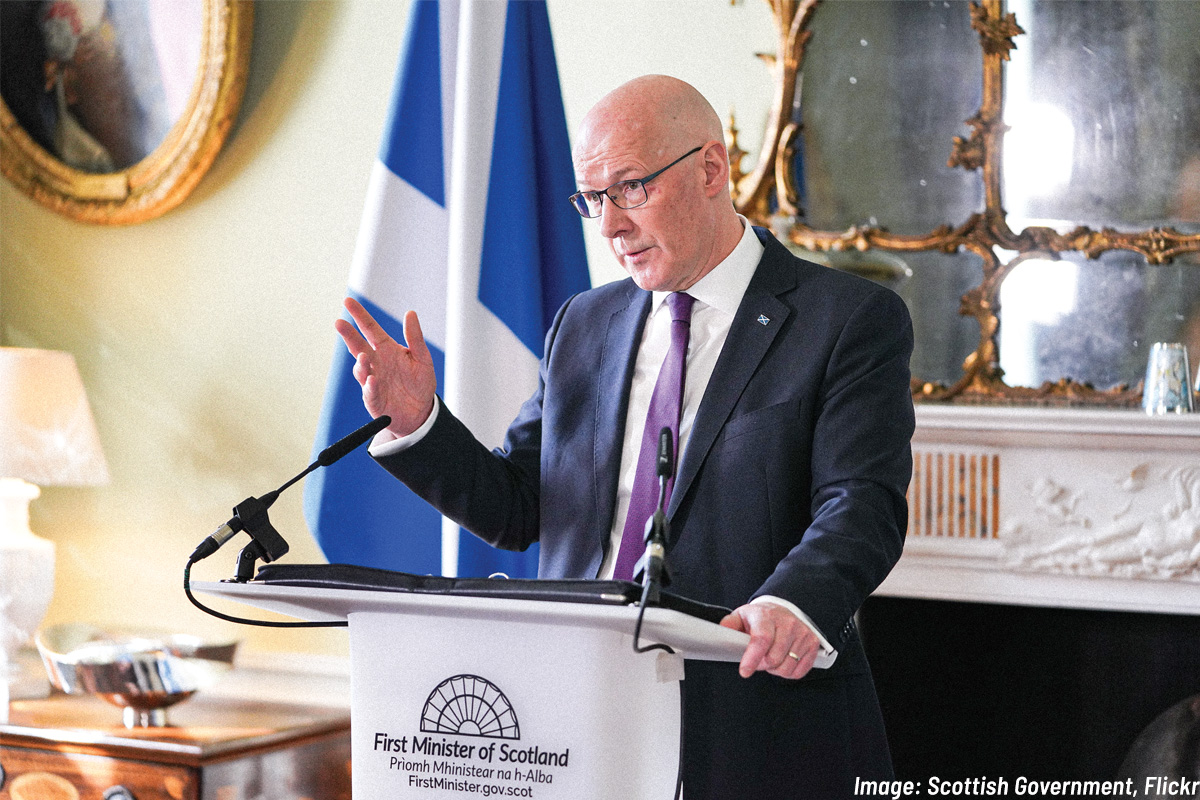The July 10th public sector strike will be a significant step forward for the labour movement in Britain, with possibly up to two million workers participating. It has been dubbed by the press as a “mini general strike”. The task for the labour movement now is to ensure that the continued fight back against the hated coalition government is united throughout Britain.
There’s no doubt that the July 10th public sector strike will be a significant step forward for the labour movement in Britain, with possibly up to two million workers participating. It has been dubbed by the press as a “mini general strike”.
Pay cuts and cuts to public services have affected workers and the poor throughout the governed areas of the Coalition, including all the islands within its jurisdiction, the six counties of the North of Ireland, and the British mainland from Land’s End to John O’Groats. Regardless of geographical location or national identity the working class and other impoverished and exploited layers are continuing and will continue to be victims to the coalition government’s austerity measures. From this it only makes sense that any fight back against this government should aim to include workers throughout the whole of Britain.
Objective conditions north of the border
Of course we do not take a light-hearted, flippant attitude towards strike action; we would not advocate workers striking in Scotland simply because workers are striking throughout the rest of the UK. Striking is a big sacrifice for workers to make and can’t just be called for whenever. Trade unions must always take into account the objective conditions, whether there is a mood for a strike, how successful it is likely to be, how it fits in with industrial action in other geographical areas, whether there will be support outside the strike, and what the strike can be followed up with. Bad timing of a strike can end up with a strike being lost, the demoralisation of members, and a weakening of the movement. Strikes must be timed to have a maximum effect. However, it is fair to say that in general, the wider the area covered by a strike, the more success it is likely to have.
With regard to teachers, it is unfortunate that the strike date is on a day when Scottish teachers are on holiday. However, earlier this year there was a UK wide strike of teachers which did not include Scotland even though teachers north of the border were working and could have potentially struck at the same time.
There are two potential reasons why so far joint action has not happened. One being that the teachers either side of the border, for historical reasons, belong to different unions, with the EIS dominant in Scotland and the NUT being the main union throughout the rest of the UK. Objectively, this is not a problem at all. It should pose no barrier provided that full solidarity and cooperation is shown between the organisations at all levels. Holding a strike at the same time could be achieved easily.
The other reason is that the objective conditions in Scotland and the rest of the UK are currently different. We appreciate that this is a more difficult, but not impossible, obstacle to overcome. The attacks on comprehensive school teachers have been temporarily cushioned by the Holyrood government whereas in the rest of the UK they have been hit by the cuts and privatisations to a sharper degree. However, the issues of overwork, under pay, job insecurity, bullying, bureaucratic management and increasingly more blatant pressure from the private sector are also huge issues for teachers in Scotland. Larry Flanagan (EIS General Secretary) said the day before the last strike:
“While, here in Scotland, there is continuing strong support for the principles of comprehensive education, we do continue to face similar challenges on issues such as pay and conditions, pensions, curricular change and excessive workload.”
The global crisis of capitalism
Regardless of the result of September’s referendum, teachers north of the border will be affected. We’re living through a global crisis of capitalism. Without a second thought this crisis will cross local authorities, provinces and national borders. The current cushioning of cuts in Scotland is only temporary and it is the job of the trade union leadership to tell this to their members. If they don’t tell them now, workers will find out anyway only through bitter experience. If the EIS were to campaign politically and consistently on this point, then by the time a strike in the rest of the UK came around it would be much more likely that there would be a mood for it in Scotland, and hence the chances of success for the whole strike would be much higher.
There is a similar situation with the fire-fighters. Although the FBU covers fire-fighters throughout the UK, it is currently involved in a dispute with the government sparked by the decision to raise the retirement age to 60 in England and Wales. The retirement age in Northern Ireland and Scotland is 55 (also proven to be a dangerous age for fire-fighters) and has therefore not sparked such a dispute. FBU General Secretary, Matt Wrack, stated the following:
“The FBU has wanted to settle our dispute for a long time, but the government at Westminster is simply not listening. We are therefore proud to take strike action alongside our colleagues in other unions on 10 July.”
In this case it was clearly easier for the FBU to mobilise its members in England and Wales who have a lot of recent experience in industrial action. The problem of mobilising throughout the UK is difficult when there are different objective conditions. However, as with the teachers, such challenges can be met. With solid political campaigning in advance of the strike, the FBU in Scotland and Northern Ireland should point to England and Wales and say, “This is our future if we don’t stand up now”.
Militant fight needed
Unite did not ballot their members in Scotland due the fact that council workers have been given the “living wage” (currently standing at £7.65/hour). It must be stated that this very modest concession wasn’t just given to council workers through the good nature of council bureaucrats, but through working class pressure from a unionised workforce and from outside the traditional trade unions.
For example in Edinburgh, in the last three years, there have been formed small but organised campaign groups of trade unionists and other local working class people fighting against the cuts to councils, their employees and services. They’ve organised demonstrations, deputations, awareness-raising activities and even hustings where politicians were grilled to the point where their faces were red and their suits were visibly dripping with sweat. It must be stated that this concession, along with others, including the reimbursement of tenants charged with the bedroom tax in Edinburgh, were only achieved through such pressure, and such campaigns are an inspiration.
However, it is far from the end of the battle. The “living wage” is a very mild increase and not nearly enough for someone with a family to support. It also must be highlighted that pay is only one of the issues. In Edinburgh the relative strength of unions and anti cuts campaign groups has made the life of council bureaucrats more difficult and has forced them to release the “the bold initiative”. This is the council’s fancy way of implementing austerity and attacking the working class of the city, both the council workers and the council service users (i.e. almost everyone), but disguising them with words such as “lean workforces, procurement and savings” (read redundancies, privatisations and cuts). This is an insult to the intelligence of Edinburgh’s people who, if not now, will very soon see through it. A councillor at Edinburgh East CLP claimed there was a difference between savings and cuts to which he was politely challenged by this article’s author with “Where does the saved money go? Does it go back into our services or does it go bail out the banks?” To this he had no reply.
Concessions only temporary under capitalism
The point here is that under capitalism in its current crisis, even mild reforms such as a wage increase or the removal of the bedroom tax will only be very temporary and will always be resurrected as austerity somewhere else. Whether it be through cuts to pay, pension entitlement, holiday entitlement, availability of local comprehensive education, council supplied leisure activities, etc., the crisis will manifest itself one way or another and it will always be the working classes who have to pay. Unite should not hold back from explaining this to their members. The gain of a wage rise may have a temporary pacifying effect on members, but the Unite leadership should not be complacent about this. They must tell their members the truth about what is to come. If this were to be done boldly and consistently, then mobilising their members above the border would become significantly easier.
Unison is in fact balloting its local authority members in Scotland to strike. But this is a consultative ballot for a strike at a later date. The agitation they are using is almost exactly the same as was used to ballot for Thursday’s strike in the rest of the UK. The employer’s pay offer of 1% is the same and they say the following:
“The pay of home carers, road workers, cleansing staff, social workers, public health workers, education staff and all the other workers who deliver has been cut. Scotland’s essential services are worth far less now than they were in 2010 yet they keep services going against the odds”
We completely agree! This is exactly why the local authority workers in England, Wales and Ireland are striking next Thursday. The fact that Unison are taking the risk of balloting shows that the leadership do have some degree of confidence in their members which makes it all the more frustrating that it wasn’t carried out to coordinate with the Thursday’s strike.
The GMB national secretary, Brian Strutton, said the following:
“GMB members serving school meals, cleaning streets, emptying bins, looking after the elderly, helping children in classrooms and in all the other vital roles serving our communities are fed up with being ignored and undervalued.”
Indeed! GMB also has Local Authority branches in Scotland whose members are also fed up with being ignored and undervalued. However, so far GMB Scotland has been silent on this issue.
The PCS did ballot their members in Scotland with success and they will strike on Thursday with an estimated 28,000 coming out. PCS activists have been heard saying “we’re going at it alone”, almost with an air of pride in the radical reputation of their union. However, as noble and sacrificing as “going at it alone” is, PCS should use this successful ballot as an example and publicly call on other unions to campaign for the same cross border strike action.
Unity is strength
As is well known, in September the people of Scotland will be going to the polls to vote on whether it should be a separate nation. Where the Labour Party and trade union leadership have failed, a void has been filled with nationalism particularly amongst the youth and traditionally more class conscious layers of the working classes. Many on the left have bent to this nationalist pressure and have advocated a Yes vote.
A point often made by the left separatists is that separation won’t stop joint struggles either side of the border. We would never claim that joint struggles are impossible. This would be a rather defeatist attitude for internationalists to take. However, no-one can deny that serious obstacles will be put in the way. The lack of cross border coordination on Thursday’s strike is a warning to how even the partial devolution of workers organisations themselves can cause disorganisation and lead to serious weaknesses in the labour movement, obstacles which would become significantly bigger if Scotland were to separate. Unity is strength.
An idea often heard amongst the left separatists is that the people of Scotland are somehow more progressive. At a recent public meeting, the Scottish Socialist Party’s Colin Fox spoke about Scotland’s “social democratic centre of gravity” and English working classes are often commented on as being “more conservative”. It’s not surprising that there has been a silence from such groups in the run up to this strike. This is because the event flies in the face of such ideas. Conditions determine consciousness. When people suffer attacks in their living standards whilst seeing the inequality of society and the rottenness of the establishment, they will eventually come to radical conclusions. This will happen regardless of geographical location or even national identity. Thursday’s strike is a sign that this is beginning to happen. What this needs is not separation but unified and coordinated labour movement with a leadership prepared to fight for the socialist transformation of society.
Rather than advocating separation, socialists in Scotland must campaign within the current mass organisations for a unified labour movement with a revolutionary leadership.
Trade unions in Scotland should boldly and consistently be informing their members about the crisis of capitalism and challenging all illusions that Scotland, whether independent or not, will be exempt from this. From this they should aim to coordinate strikes with workers throughout the rest of the UK. A failure will lead to a weakening of the labour movement and the strengthening of reactionary national divisions.






